Read Daily To Destroy The Disease
Mahanidhi Madan Gopal Das
Vaisnava aparadha is spiritual suicide. But unfortunately, thousands of devotees are dying daily from this terrible deed. Vaisnava aparadha is like cancer. And it just grows and grows invisibly inside one slowing devouring the vitals of one’s bhakti.
A Vrajavasi saint living in Varshana named 108 Sri Sri Vinod Hari Das Babaji Maharaja gives the following important teachings about Vaisnava ninda, disrespecting and offending devotees of Bhagavan Sri Krishna. Definitely, if you read this post 108 times, you will understand and realize the unique and special position of EVERY SINGLE VAISNAVA without distinction.
Then once and for all the dreaded deadly disease of Vaisnava ninda will be removed, and peace, pure vision, balance and joy will arise in your purified consciousness.
THE SUBJECT OF VAISNAVA APARADHA
(note: this post is copied from net as it is without editing)
Sri Vinod Haridas Babaji Maharaja said, “The other aparadhas break the branches and leaves of the wish-fulfilling creeper of bhakti. However Vaisnava-aparadha is very powerful and it uproots the creeper altogether.
If we commit the other aparadhas the creeper will, no doubt, grow weak, but it will continue to live. However, if we commit Vaisnava-aparadha the creeper of bhakti dries up completely. Shastra say, “If we beat, criticize, disrespect, get angry with, do not express pleasure on seeing, do not pay obeisance and do not glorify a Vaishnav we commit Vaisnava-aparadha.” – (Sri Hari-bhakti-vilas)
Sriman-Mahaprabhu has especially warned the sadhak about this Vaishnavaparadhas. Sri Chaitanya Charitamrita and Sri Chaitanya Bhägabat mention Vaisnava-aparadha repeatedly. Meaning – “Chaitanya Gosain (Sriman-Mahaprabhu) delivered even the drunkards, but He sent the ones who indulge in Vaishnav-ninda in the Kumbhipäka hell.
Gourachandra will deliver everybody except the ones who criticize the Vaishnavs since they are the most fallen ones. Even if one pays obeisance to Sri Bhagavän, he will perish if he criticizes a devotee since it strikes Sri Gourahari like a spear in His heart. All Shästras declare that even if one is all-knowing he will fall down if he criticizes a Vaishnav. Although Sri Krishna’s Holy name cleanses us of all the sins, He cannot deliver us from the effects of Vaisnava-aparadha.”
– (Sri Chaitanya Bhagavat)
“heno baishnab-aparadhas jasi uthe hatimata,
upariya chinde tar shuki jay pata.”
Meaning – “A Vaisnava-aparadha is like an intoxicated elephant. It uproots the wish-fulfilling creeper of bhakti and its leaves dry up.”
– (Caitanya Caritamrita)
Besides these, other Shastras too have warned us about Vaisnava-aparadha.
“ninda kurvanti ye mudha vaishnavanang mahatmanang,
patanti pitribhih sardhang maha-raurava-sansthite.”
Meaning – “All those fools who critisize Vaishnavs, they fall into the Raurava hell8 along with their ancestors.” – (Skanda Puran)
“janma prabhriti yat kinchit sukritang samuparjiang,
nasham-ayati tat sarvang pidayed yadi vaishnavan.”
Meaning – “Those who hurt Vaishnavs, all their pious activities (even those performed in previous lifetimes) come to a naught.”
– (Skanda Puran)
“pujitaih bhagavan vishnur-janmantarshatair-api,
prasidati na vishwatma vaishnave cha-avamanite.”
Meaning – “Sri Bhagavan is never ever pleased with all those who show disrespect towards Vaishnavs.” – (Srimad-Bhagavatam)
So now, you can understand how dangerous Vaisnava-aparadha is. If we keep on collecting Vaisnava-aparadha there is no point in performing lots of bhajan. There is no way we can progress even the slightest bit in bhakti.
Vaisnava-aparadha does not constitute only Vaishnav-ninda. May be someone comes to you and does Vaishnav-ninda, you only say “Yea, yea, that’s right”. Even then, you will have to bear the entire effect of Vaishnav-ninda. It is like this – suppose, someone comes to you with an application, you do not say anything, but only sign below it; this is proof enough that you are making that statement. Similarly, if someone comes to you and does Vaishnav-ninda and you quietly nod your head then you should understand that you too are making the same comments.
Vivek das – That is all right. However, Shastras prescribe some behavioral code for the Vaishnavs, do they not? If some Vaishnavs do not follow these rules – instead – they behave in a completely opposite manner then why can we not mention it? Why should that constitute Vaisnava-aparadha?
Gour kripa – Most certainly, it will constitute Vaisnava-aparadha. Even if we see some Vaishnav behaving against the Shastriya-rules, we must not indulge in ninda. Instead, we should give him full respect, as a sadhu deserves to be given. This is because the Lord says in Sri Bhagavad Gita –
“api chedsuduraharo bhajate mam-ananyabhk,
sadhureva sa mantavyah samyag vyavasito hi sah.”
Meaning – “Even if someone is most sinful, but he worships me alone, then you must consider him to be a sadhu.”
Hence, if we ever disrespect a sädhu it is an aparadhas.
“hari-bhakti-para ye cha harinama parayanah,
durvritta va suvritta va tebhyo nityang namo namah.”
Meaning – “Whoever does Hari-bhakti and chants Holy Name – he may be good or bad
– I pay him my obeisance.”
– (Brihan-naradiya Puran)
“bhagavati cha haravananya-cheta
bhrisha-malino’pi virajate manushyah,
na hi shasha-kslushachchavih kadachit
timira-parabhävatam-upaiti chandrah.”
Meaning – “One who has bhakti for Sri Krishna alone, even if he is seen to commit some sinful activities, he always emits the aura of bhakti, just as the moon, although blemished, is not defeated by darkness.” – (Nrisimha Puran)
Therefore, we must never ever show contempt for a Vaishnav. Sri Chaitanya Bhagavat has strictly warned us –“We shall never get any respite if we criticize a worthy Vaishnav, for his behavior is beyond our limited understanding. Sometimes a worthy Vaishnav commits the same activities as a sinful person, only by Sri Krishna’s kripa, someone can understand this – but there are others who fall in trouble (of Vaishnav-ninda) and perish.
Those who do not fall in this pit, they survive in bhakti. I can see only one way out of this peril – it is best to glorify and behave humbly with everyone. In this mood, we must chant Holy Name and carefully hear from the great devotees. Then Krishna gives them divine intelligence, he crosses over the material ocean and no one can stop him.”
Vivek das – All right, I will not do Vaishnav-ninda. However, if someone comes to me and does the same then how is it harmful?
Gour kripa – Of course, it will harm you! If someone come to you and does Vaishnav-ninda – you don’t know whether that person is telling the truth or a lie, yet your respect towards that Vaishnav will decrease, won’t it? Immediately you will incur Vaisnava-aparadha ! This is why Shastras have ordered us not hear Vaishnav-ninda.
“nindam bhagavah shrinvan tatparasya janasya Vaisnava-aparadha,
Tato napaiti yah so’pi yatyadhah sukritachchyutah.”
Meaning – “On hearing Sri Krishna-ninda and ninda of Sri Krishna’s devotees, those who do not leave the place, he loses all his sukritis9 and falls down to the hellish planets.”
(Srimad-Bhagavatam)
“sadhu-ninda shunile sukriti hoy khoy,
janma janma adhahpat bede ei koy.’
Meaning – “The Vedas state that if we hear sadhu-ninda we lose our sukriti and fall down in every birth.”
From all these statements made in Shästras we can understand how dangerous is Vaisnava-aparadha ! So whoever wishes to progress in bhakti must be extremely careful about Vaisnava-aparadha. It is best to consider every Vaishnav as Sri Govinda’s dear devotee, show him respect and pay obeisance.
Vivek das – Does this mean that even a Babaji should show respect to a householder and pay obeisance?
Gour-kripa – A Vaishnav is a Vaishnav. He may be a grihastha or a renounced – that is immaterial. We must never distinguish. We must show respect, behave respectfully and pay dandavat to every Vaishnav. Otherwise, we’ll be committing an offence. Sri Bhagavän sees our heart. Whose heart is always filled with Krishna and he is not interested in material things, is a true Vaishnav. Sri Gita has defined ‘sannyas’ as –
“jneyah sa nitya-sannyasi yo dweshti na kankshati,
nirdvandvo hi mahabaho sukhang bandhat pramuchyate.”
Meaning – “O Mahabaho! He who never desires anything material, is devoid of anger and envy, know him to be an eternal sannyasi. A pure devotee like him, who is devoid of such dilemma very easily, transcends material bondage and gains liberation.”
Sri Bhagavan has said in Sri Gita –
“anashritah karmaphalang karyang karma karoti yah,
sa sannyasi cha yogi cha niragnirna chakriya.”
Meaning – “Whoever discharges his duties without expecting any fruit thereof; he alone is a sannyasi, a yogi and not one who has given up all activities.”
Therefore, if we accept the above statement of Sri Gita, then it is quite possible that a grihastha, whom I have shown contempt so far, is actually a sannyasi. Therefore, I have no business to feel proud ‘Ohh! I am a Babaji’ and treat a grihastha with contempt. I will only be committing Vaishnavaparadhas if I think him to be ‘a person worthy of my mercy’ or ‘a materialist’.
Now this does not mean a grihastha should disrespect a Babaji and think – ‘What is there in a dress? Greatness depends on the quality of bhajan. I am a nice devotee, I perform good bhajan, while this person is only a Babaji in name, and he does not behave like one.’
Even this is wrong. If a grihastha thinks like this and has contempt for a Babaji, he is crossing maryada and so is committing Vaisnava-aparadha. If a grihastha sees a young Babaji and thinks – “I am old and experienced. Moreover, I have lived for so long in Vrindävan and performed bhajan while this Babaji is of my son’s age, so why should I pay dandavat to him?
Rather I should bless him.” This is an aparadhas. We must remember that ‘kaupin’ is not something ordinary. It is according to Sriman-Mahaprabhu’s wish and Goswamis such as Sri Rup and Sanatan have worn this attire. Therefore, we must never disregard this dress.
“maryada langhile hoy narake gaman.”
Meaning – “If we overstep ‘maryada’ we shall go to hell” – (Caitanya Caritamrita)
He may do bhajan, he may not do bhajan, he may or may not behave properly, and still we should not disrespect him. Moreover, who knows, I am considering him to be my junior, I am thinking – ‘He is a newcomer, what does he know of bhajan?’ – In reality, he may have performed asadhan-bhajan for many previous lifetimes and is in a much more advanced state than I am.
Therefore, I will be at a loss if I disregard him. Hence, it is best to consider every Vaishnav higher than myself, pay dandavat, and treat him with respect. Then we have nothing to fear. We must do dandavat to anyone who dons Vaishnav emblems such as tilak and Tulsi.
“sakal baishnaber sahit abhed dekhiya,
je krishna-charan bhaje se jay toriya.”
Meaning – ‘One who worships the lotus-feet of Sri Krishna without discriminating between Vaishnavs, he is delivered.”
– (Sri Chaitanya Bhagabat)
“e-kale je baishnaber bodo chhoto bole,
nishchinte thakuk se janibe koto kale.”
Meaning – “Whosoever discriminates between Vaishnavs may rest in peace, for it will take him a long time to realize the Truth.”
(Sri Chaitanya Bhagabat)
Vivek das – Tell me, when I see a Vaishnav, will it not do if I pay him dandavat mentally?
Gour kripa – How is that? Pranam means ‘By body, mind and speech’. If we do not pay dandavat bodily then it means we have a veiled pride. What will happen if he considers me inferior? Only those who think like this will not pay dandavat openly.
Sriman-Mahaprabhu does not like this sort of Pranam. If we are ashamed to bow our head in front of Vaishnavs how van we expect to advance in the path of bhakti as shown by Sriman-Mahaprabhu?
‘baishnab dekhiya je na noway munda,
sei mundo pode giye naraker kunda.”
-(Sri Chaitanya Bhagabat)
Meaning – “The one who does not bow his head before a Vaishnav, his head falls into the pit of hell.” When we meet a Vaishnav we should at least join our palms, lower our head, speak humbly and thus show respect.
Vivek das – O exalted one, today I can see the Vaishnavs embroiled in so many quarrels, due to this my faith is shaking. What should I do?
Gour kripa – Never ever speak like this, because Sri Chaitanya Bhagabat is saying –
“nitya-shuddha gyan bastu baishnab sakal,
tobe je koloho dekho sob kutuhol.
iha na bujhiye kono kono buddhi nash,
eke bonde, ar ninde, jaibeko nash.”
Meaning – “All Vaishnavs are eternally pure and have pure knowledge, when you see them quarrel it is only in play. Some foolish people don’t understand this and take sides. They praise one and criticize the other – they will surely perish.”
Therefore we must think – “It is only a leela of the Vaishnavs. I am foolish, so am unable to comprehend” and we must not take sides. If you support one and find fault with the other, you will harm your bhajan.
“je papishtha ek baishnaber paksha hoy,
anya baishnaber ninde sei jay khoy.”
Meaning – “He is verily a sinner who supports one Vaishnav and criticizes another. Such a person will surely perish. – (Sri Chaitanya Bhagabat)
We must not even go where there is groupism and Vaishnav-ninda.
je sobhay baishnaber ninda matra hoy,
sarba-dharma thakileo tär hoy khoy.
Meaning – Even if an assembly follows all the rules of Dharma, yet indulges in Vaishnav-ninda, it perishes.” – (Sri Chaitanya Bhagabat)
Vivek das – But O exalted one! I live amidst so many Vaishnavs. Then how can I save myself from such Vaisnava-aparadha?
Gour kripa –For this we must stick to a few rules.
1. We should always remain engrossed in bhajan and sadhana.
2. We should not discuss anything else other than God.
3. We should speak with anyone only when it is absolutely necessary to do so.
4. We should walk on the road with our head lowered and palms joined – thus showing respect to everyone.
5. It is best to consider everyone superior to us.
6. When one comes to us and critisizes another person we should say, “I have remembered some urgent work” and quickly leave that place.
7. If we ever see some fault in another, we should think, “my heart is evil, so I am finding a fault in him, it is my fault and not his.” In this manner, we must chastise ourselves.
If we do not live like this, we shall never get rid of aparadhas and these huge barricades will continue to block our progress in bhakti. We will never even realize when, unknown to us, these aparadhas have accumulated and have formed mountains on our path.
Vivek das – Now I am really scared. I have begun to realize that Vaishnavaparadhas is very dangerous indeed! If I collect Vaisnava-aparadha, then no matter how much I try, I will make no progress in bhakti whatsoever. Please tell me how I can rid myself of these Vaisnava-aparadha. Please have mercy on me.
Gour kripa – Sriman-Mahaprabhu Himself has instructed how to get rid of Vaisnava-aparadha. He said –
“prabhu bole upadesh korite se pari,
baishnab-aparadhas khondaite nari.
je baishnab-sthane apardh hoy jar,
punah se khomile se ghuche nohe ar.”
Meaning – “The Lord said –I can instruct you on this matter, but I cannot take away your Vaisnava-aparadha. The only way to get rid of this aparadhas is to beg forgiveness from the person against whom you have committed the aparadhas. If he forgives then you are saved, there is no other way.” – (Chaitanya Bhagabat)
Therefore, we must please the one against whom we have committed an aparadhas by glorifying him and showing him respect. It does not mean we should go and angrily beat our head on the ground saying, “Sir! Please forgive me. It is entirely my fault! I should have never spoken to you at all! From now on I‘ll never talk to you and you mustn’t speak to me either.” In this manner if we harbor anger against that person then it is of no use.
The best way to rid ourselves of aparadhas is to repent. “Alas! I am ignorant, so I have committed aparadhas against a Vaishnav. Unknowingly I have hurt the feelings of a Vaishnav, shame on me! I am not qualified to be called a devotee at all. If my heart is blemished like this I shall never ever progress in bhakti.” In this way, we should be ashamed of ourselves. Bow at the feet of the one against whom we have committed aparadhas and cry out in misery for forgiveness.
Sri Vishwanath Chakravartipad has stated the same –
“tatashcha daivat tasminnaparadhase jate ‘hanta pamarena maya sadhushu
aparadhasamiti’ anutapta janah ‘krishanou shämyati taptang krishanano
evayam’ iti nyayena tatpadagra eve nipatya prasadayamiti vishannachetasa
pranatistuti samman-adibhis-tasyopashamah karyah.”
After much trying if we are unable to please the devotee, we should continue to try to please him by doing things to please him. If we are still not successful, we should chastise ourselves, be very much repentant and take the shelter of Holy Name. We must also take an oath that we shall never again commit am aparadhas like this. Then some day Sri Nam-prabhu will take mercy on us.
Vivek das –That’s good. The Shastras say, “If we take the shelter of Holy Name we will be rid of all aparadhas.” So isn’t it better to follow Shastra and take the shelter of Holy Name rather than beg others repeatedly to forgive us?
Gour kripa – In that case we will commit another aparadhas called ’to commit a sin on the strength of Holy Name’. We have to follow the above-mentioned rule only when we don’t know against whom we have committed an offence, or the person whom we have offended, is no more. It leaves us with no option other than to take the shelter of Holy Name. Then may be Holy Name will take mercy on us. Even then, we must remember that we must repent enough and we must be especially careful about not committing such an aparadhas again.
Otherwise, Sri Nam-prabhu will never be pleased.
Many times, we see that great devotees do not take offence in spite of behaving badly with them or insulting them. Instead, he considers it his own fault and repents. Even if someone treats him unjustly, or expresses anger, he thinks, “I have hurt him – it is all because of my faulty character.” Thinking thus, he chastises himself. Such is the nature of a pure devotee.
“rukshakshara girah shrinvan tatha bhagavateritah,
pranama-purvakang kshantva yo vaded-vaishnavo hi sah.”
Meaning – “He is a Vaishnav who, in spite of hearing harsh words from a devotee, pays obeisance unto him and praises him.”
– (Linga Puran)
Although a great devotee may forgive us, yet the specks of dust on his feet do not forgive. Hence if we think, “Oh! He is a great devotee, he is not hurt, so I have not committed an aparadhas,” the aparadhas will not leave us and we shall have to suffer for it. All those who have gained Bhaktidevi’s kripa, they never sight faults in others. They only sense their own faults. Let me tell you about the great Saint Tukaram.11
Sri Krishna is saying –“O Uddhav! Know Acharyadev to be non-different from me. Do not ever disregard him. Do not ever disrepect him by considering him a mere mortal. Sri Gurudev is the abode of all celestial beings.”
– (Srimad Bhagavatam)
Regarding this Sri Chaitanya Bhagabat says –
“The Lord showers mercy on a womanizer and drunkard, but He destroys a ninduk although he may be a Vedantin18. He says –‘I solemnly pledge that Krishna will easily deliver you if you do not indulge in ninda’.
The Lord kills the demons in only one birth, but He destroys a ninduk every moment in every life. We should understand that Krishna is the all-powerful Supreme controller and all the Shastras declare that ninda angers Krishna the most. A scholar may have studied the four Vedas, yet if he commits ninda he is punished by drowning in the Kumbhipak hell in countless births.”
Hence, if we want to gain Sriman-Mahaprabhu’s mercy we must refrain from ninda. Moreover, when we do ninda we accept the other person’s bad qualities and our good qualities flow through him. “Ninda is useless. It only results in sin. He who does not indulge in ninda is blessed indeed”
If we fix our gaze on this declaration of Sriman-Mahaprabhu, He will most certainly shower His kripa on us – harbor no doubt about it.
Vivek das – Now I know why, in spite of chanting Holy Name so many times, I am not progressing in bhakti. The saddest part of my life is that, I forsook everything – my home, luxury, wife, children, and relatives – but I could not give up para-ninda. Please tell me, how can I rescue myself from this miserable state?
Gour kripa – Sriman-Mahaprabhu has said in this context –
“I tell you there is but one truth. You have committed many aparadhas (ninda) unknowingly; but henceforth if you never ever commit ninda and constantly glorify Sri Vishnu and the Vaishnavs, then these aparadhas will leave you. This is the only means to get out of this trouble. Even if you perform crores of penances, you will not be cleansed.”
Sri Goursundar continued, “Whoever does not obey this command and still commits ninda is verily a sinner and floats in the ocean of misery. When someone indulges in the ninda of my servant, my all-powerful Holy Name destroys him. I have countless servants in infinite universes. Whoever is envious of a single one of them surely perishes.”
– (Sri Chaitanya Bhagabat)
– (Sri Chaitanya Bhagabat)
So, let us realize that He exists in every element. If we do not respect each and every soul, we are hurting Him Whom we are worshiping. This sort of bhajan is futile.
We perform Love-sadhana. Will our love remain confined to just one kunja24? Then it is a very narrow love indeed! But this is not true! When a single spark of this Love enters us, we realize Love within each molecule, nay, each atom. This Love is so magnificent that we should be careful not to minimize it.
So the bard has sung –
“O mind! You did not bow your head at every foot. Do you not realize the Treasure of your heart dwells amidst all? Bhagavan is in every being and He is the same. You puffed up and insulted others. O my foolish mind! Do you not know – your Priceless Beloved Krishna exists in so many forms? If you desire Him, if you have any wish to get Him, make everyone your own, beg at his or her feet and love all. If you cannot do it, your sadhana and bhajan are worthless. Consider yourself fallen; you will gain from it. You will get His lotus-feet, intoxicate your heart and beget prem. Otherwise you will only come and go (roam around in the cycle of birth and death) and never gain that priceless treasure called ‘Love’.”
We simply cannot avoid this point in our sadhana. We shall love Bhagavan and not love our fellow men – then we can be sure that we shall never love Bhagavan. If we really love Bhagavan, we shall love His creation as well. I dislike or envy my fellow men and I say –“I love Bhagavan”. Most definitely I am a liar!! On the other hand if I don’t serve Bhagavan and say – “Service to mankind is the topmost Dharma”, I am verily a cheat.
When we experience Him as the One present in all and all present in Him, then we are Bhagavad-bhaktas (God-lovers). Srimad Bhagavatam defines the best devotee as –
“sarva-bhuteshu yah pashyet bhagavad-bhavam-atmanah,
bhutani bhagavatyatmanyesha bhagavatottama.”
Meaning – “He who experiences Sri Bhagavan in every element and perceives all objects in Him is the best devotee.”
Sri Gita agrees with the above statement –
“bahunan janmanan ante gyanavan mam prapadyate,
vasudeva sarvam-iti sa mahatma sudurlabhah.”
Meaning – “After many lifetimes a wise devotee realizes that ‘Vasudev is everything’. Such a great soul is very rare.”
There is nothing other than Him. Advay-gyan-tatva25 Sri Krishna is Swayam Bhagavan26. The more we realize it, the more we‘ll move away from hate and envy. We’ll relish Divine ras more and more. When we develop this bhäv, all will appear nice and we will like everyone. We’ll go beyond good and bad, happiness and sorrow, and submerge in the ocean of Krishna-prem. Although lotus leaves touch the water, they never get wet. Similarly, the good and bad, justice and injustice of this material world will not affect the sadhak27 any more.
Vivek das – Everything you say is true; but how shall I get this realization? How can I get rid of liking some and disliking others? I can understand that He is the same and is present in every element, but when it comes to practicing, I cannot do it. What do I do?
Gour kripa – It is not as easy as we think. To bring this bhav in us we must always keep our conscience awake. Conscience is a very sharp weapon. In all our waking hours, we must constantly feel this bhav. When we move on the streets we should awaken this feeling in us – “Sri Bhagavan exists in every element” and we should indiscriminately
Vivek das – You speak nothing but the truth. Nevertheless, I am unable to follow it. I don’t even realize when I start seeing faults in a person and feel contempt for him. Please tell me an easy remedy to get rid of this disease.
Gour Kripa – The easiest way to practice the “trinadapi” verse is to feel that God exists in every being. When He is present in everyone and everyone is present in Him then we shall not feel embarrassed to bow before anyone. Whenever we meet a person, we should get into this mood. This is the best way to practice “trinadapi”. Along with this, we should chant constantly without any gap. At the same time, we should give up all aparadhas in body, mind and speech. There is no other way to get “trinadapi” bhav30. If we do not follow this path even if show humility, it will only be external. Inside our false ego will always hold its head high.
“You must pay obeisance and have lots of respect for all beings – be it a Brahmin31, Chandal32 or a dog. It is the religion of Vaishnavs to pay obeisance to everyone. A Vaishnav who does not obey this dictum is a cheat.”
( Sri Chaitanya Bhagabat)
Nitai Gaura Sitanatha premanandi ki jai! Pure Vaisnava Behavior ki jai! Jaya Jaya Sri Radhe!

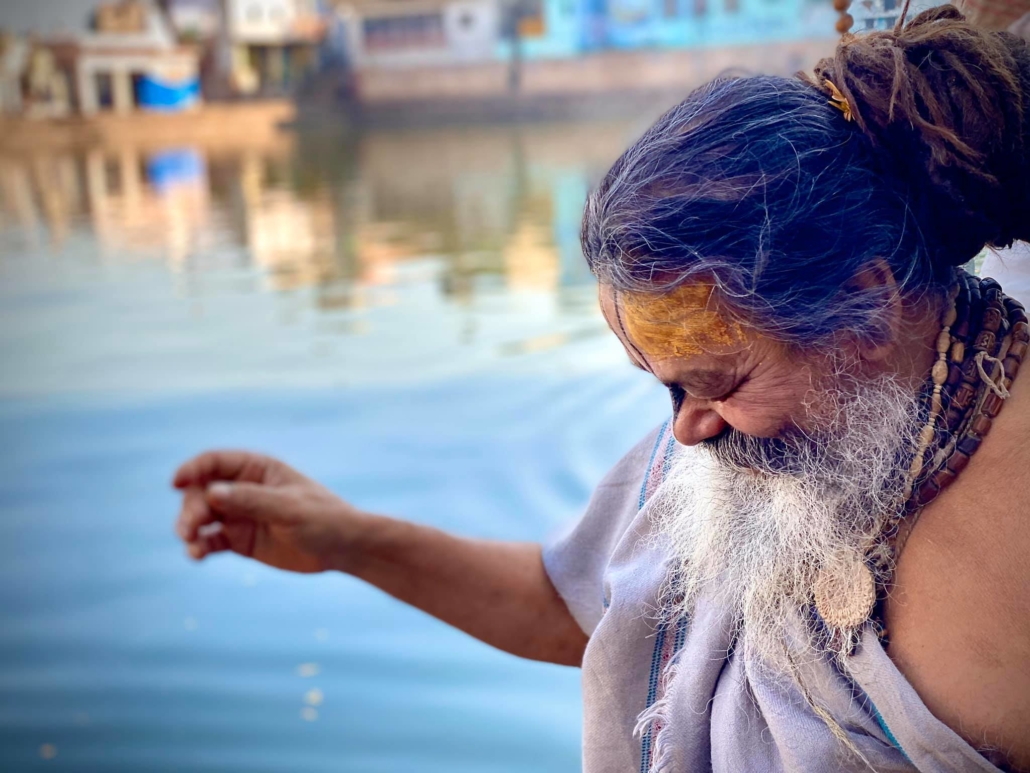
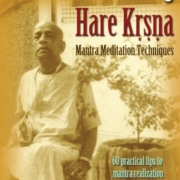
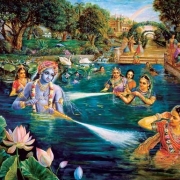

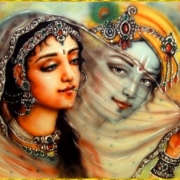
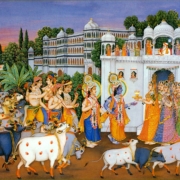
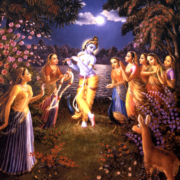


Leave a Reply
Want to join the discussion?Feel free to contribute!